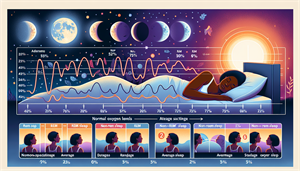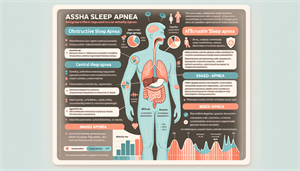
What Are Normal Oxygen Levels During Sleep?
If you’re lying awake at night concerned about oxygen levels, knowing “what are normal oxygen levels during sleep” can provide peace of mind. The normal range during sleep is between 95% to 100% saturation.
Deviating from this range can be important health-wise. This article will help you understand what these numbers mean, the various factors that influence them, and when a healthcare provider should be consulted to ensure your nightly oxygen levels support your health.
Key Takeaways
-
Typical blood oxygen levels during sleep usually fall between 95% to 100%, with natural dips that don’t commonly warrant concern unless levels drop below 92%, in which case medical advice is recommended.
-
Pulse oximeters are widely used to monitor blood oxygen levels during sleep; however, professional evaluation is advised as over-the-counter devices may lack comprehensive testing.
-
Sleep apnea is a serious disorder that causes reduced oxygen levels due to interrupted breathing, necessitating medical devices like CPAP or potential lifestyle changes to maintain normal oxygen saturation.
Deciphering Normal Oxygen Saturation Levels in Slumber
Think of your body as an intricate city, bustling with activity, and the red blood cells as diligent delivery trucks. They’re tasked with transporting precious cargo - oxygen - from the lungs to the remote corners of your body, ensuring the smooth functioning of organs and tissues.
The binding of oxygen to hemoglobin, a protein in red blood cells, facilitates this essential transportation. The biconcave disc shape of red blood cells and their increased surface area-to-volume ratio contribute to the efficient exchange of oxygen, allowing them to navigate through different blood vessels like expert drivers on a busy highway.
Shifting our attention to a person’s blood oxygen level, particularly the typical blood oxygen levels during sleep, on an average night, these usually range from 95% to 100%. However, you might observe a slight dip as a result of natural fluctuations like periods of slow or shallow breathing and short pauses in breaths.
So, when does the alarm bell ring? A blood oxygen level lower than 92% should be a cause for concern. If it falls below 88%, immediate medical attention is required. It’s a delicate balance, isn’t it?
The Role of Red Blood Cells in Oxygen Transport
Examining the role of red blood cells further, we discover their significant contribution to our bodies. When oxygen binds to the iron in the heme group of hemoglobin, it forms oxyhemoglobin, a complex that facilitates efficient oxygen transportation by the red blood cells. This intricate process ensures that every cell in your body gets its fair share of oxygen. Yet, not everything goes according to plan always. Just as traffic jams can slow down delivery trucks, several factors can lead to a decrease in blood oxygen levels during sleep.
Conditions such as: sleep apnea, sleep-related hypoventilation, certain medications, alterations in breathing patterns across different sleep stages may contribute to this decrease. This is a complicated interaction of factors that plays out each night as you fall asleep.
Variations in Oxygen Levels: What's Considered Normal?
What about the shifts in oxygen levels throughout various sleep stages? Interestingly, during REM sleep, oxygen saturation typically decreases compared to NREM sleep. It’s as if your body is conducting a symphony, each stage of sleep playing its distinctive note. However, these minor fluctuations should not set off alarm bells. Several factors can lead to these changes, such as: Sleep apnea, Lung disease, Respiratory disorders, Heart failure, Obesity.
Understanding these fluctuations is key to comprehending the overall picture of oxygen saturation levels during sleep.
Keep in mind, a minor detour doesn’t imply you’re off track; it’s all part of the journey.


